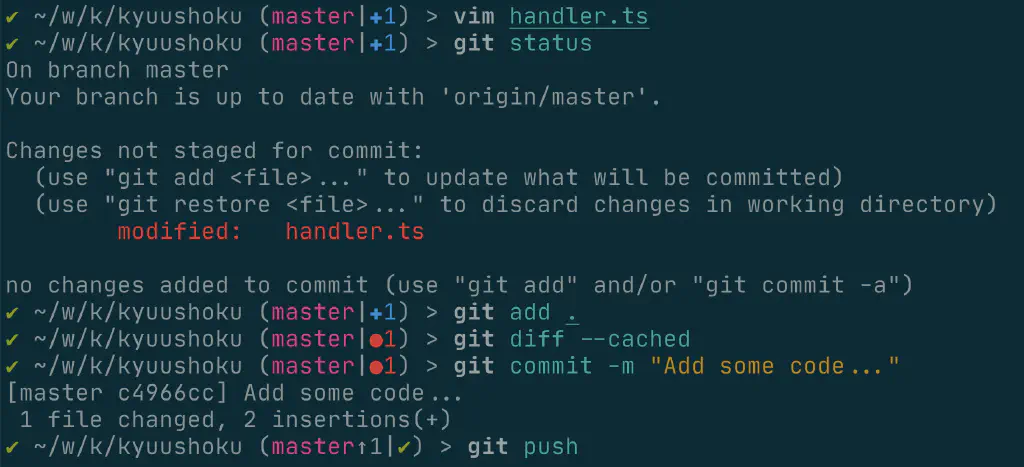
How I use Git
I’ve been using Git at work for around 10 years now. I started using Git with a GUI ( Tower -- back when I was eligible for the student discount!), but now I use the CLI for everything except complicated diffs and merges, where I use Kaleidoscope.
A question I get asked by my coworkers often is: “how in the world do you manage using Git without a GUI?”. This blog post is supposed to answer this question.
First, I use the Fish shell. It fits with the way I think. A lot of you probably use bash or zsh, that’s fine, there is lots of documentation on how to integrate Git with those shells. This is the relevant part of .config/fish/config.fish:
set __fish_git_prompt_show_informative_status 'yes'
set __fish_git_prompt_color_branch magenta
set __fish_git_prompt_color_cleanstate green
set __fish_git_prompt_color_stagedstate red
set __fish_git_prompt_color_invalidstate red
set __fish_git_prompt_color_untrackedfiles cyan
set __fish_git_prompt_color_dirtystate blue
function fish_prompt
# ...
set_color normal
printf ' %s' (prompt_pwd)
printf '%s' (__fish_git_prompt)
printf ' > '
end
I’ve omitted the irrelevant portions (status checking, # prompt when root, etc. If you want to see the full file, I’ve posted it as a gist.
On a clean working directory (that is, no changed files that haven’t been committed to the repository), this looks like this:

When updating some files, it will change to something like this:

This prompt doesn’t change in real time, so changes from other terminals won’t automatically change this prompt. I have a habit of tapping the “return” key to update the prompt.
To commit these changes:

The commands I use most often:
git add(if you only want to add a portion of a file,git add -pis your friend) /git commitgit push/git pull(git pull --rebasefor feature branches being shared with other devs)git diff @-- show all changes, staged or not, between the working directory and the latest commit of the branch you are on (@is a alias forHEAD)git diff --cached-- show only changes that are being staged for the next commitgit statusgit difftool/git mergetool(this will open Kaleidoscope)
This was obviously a very cursory, high-level look at how I use Git, but I hope it was useful. It’s been a long time since I’ve used a Git GUI full time, but whenever I do use one (for example, when helping a coworker), it feels clunky compared to using the CLI (that’s not saying I don’t have my complaints about the CLI – that’s another blog post 😇).
If you have any more questions, leave a comment or contact me on Twitter, and I’ll update this post with the answers.